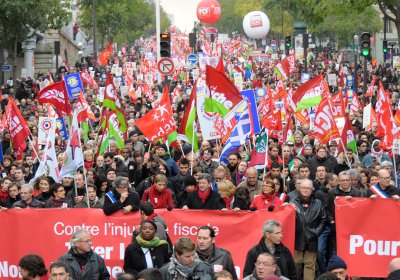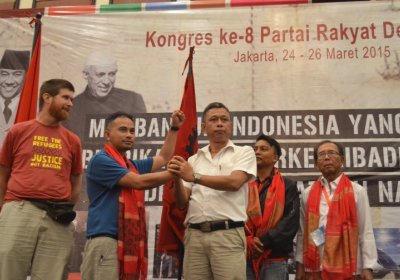Günter Grass, who was one of Germany’s most important post-war novelists, died on April 13 at the age of 87 in the town of Lübeck, in northern Germany.
Grass was perhaps most famous for his 1959 book The Tin Drum, a novel that embodied fantastical elements in its critique of Weimar and Nazi Germany. As such, his style bore resemblances to Latin America’s genre of magical realism. In 1979, the book was turned into an Academy Award winning film by Volker Schlöndorff, which won the Oscar for best foreign film.
Democracy
Internationally awarded Uruguayan author and journalist Eduardo Galeano died on April 13 of lung cancer at age 75 in Montevideo, the capital of Uruguay.
Born September 3, 1940, Galeano was author of about 35 books, including 1971’s Open Veins of Latin America, which details how Western powers have exploited Latin America and its resources for centuries. It became a bestseller overnight after the late Venezuelan president Hugo Chavez handed the book a Barack Obama during the fifth Summit of the Americas in 2009.
Greek Prime Minister Alexis Tsipras said on April 2 that his government would strengthen the country's public health system by the hiring of 4500 extra staff and abolishing a compulsory €5 fee for treatment at public hospitals, TeleSUR English said that day.
The measure forms part of a broad package of reforms aimed at overhauling the country’s broken medical system by providing universal access to quality healthcare.
The Portuguese tax-haven and tourist island of Madeira — a watering hole of Europe's super-rich — was the unlikely site of gains for the Left Bloc and the anti-corruption citizens’ movement Together for the People (JPP) in March 29 elections for the autonomous region’s legislative assembly.
The JPP, whose lead candidate Elvio Sousa promised “a different way of doing politics … favouring the most victimised and the middle class”, won five seats (10.34%) in the 47-seat legislature.
The Greek parliament has debated a proposal to establish a committee to investigate loan agreements between previous governments and international lenders, TeleSUR English reported on March 31.
The motion, tabled by ruling anti-austerity party SYRIZA, would examine credit accords dating back to 2009 with organisations including the International Monetary Fund, the European Union and the European Central Bank.
French politics further confirmed its rightward trajectory after the second round of departmental elections on March 29.
There are 101 departments and 4108 councillor positions across the country. Departments are in charge of local roads, school buildings and buses, welfare allowances and various other local issues. But the elections also represent a barometer of the political situation in the country.
The governing nominally centre-left Socialist Party (PS) suffered a humiliating defeat against a right-wing united front headed by the centre-right Union for a Popular Movement (UMP).
A group of Australian academics, unionists, politicians, and others have urged the US to “stop interfering in Venezuela’s domestic affairs”. More than 70 prominent Australian progressives issued an open letter to US President Barack Obama condemning US sanctions against Venezuela on April 9.
The letter, initiated by the Venezuelan Solidarity Campaign in Melbourne, is printed below. The letter was handed to US consulates in Sydney and Melbourne on April 10.
* * *
No more coups! No more interventions! Repeal the Executive Order!
Dear Mr President,
The left-wing People's Democratic Party (PRD) held its eighth congress in Jakarta from March 24-26. This was the first time its congress was held openly.
The open congress marks an important new stage of development for the party, which has a history of underground organising dating back to the era of the Suharto dictatorship that was overthrown in 1998.
Police have cautioned the Knitting Nannas Against Gas that their actions could be illegal and warned them to stop protesting.
For three years the group has met weekly outside the offices of MPs in NSW to protest against coal seam gas development in the state. The nannas say their knitting is a form of non-violent political activism to remind politicians they are being watched.
There is a tense stand-off right now between Greece's government and the so-called troika — the European Commission, the European Central Bank (ECB), and the International Monetary Fund (IMF). ECB President Mario Draghi recently went so far as to deny that his institution was trying to blackmail Greece's left-wing anti-austerity government.
But blackmail is actually an understatement. It has become increasingly clear that the troika is trying to harm the Greek economy in order to raise pressure on the new Greek government to agree to its demands.
The United States is providing crucial support to regional ally Saudi Arabia ― a big buyer of US arms ― as it launches a new war in the Middle East by attacking neighbouring Yemen.
A Saudi-led coalition of Western-aligned, mainly Sunni Islamist, Arab government's launched air, naval and ground military offensive against Yemen on March 25.
Saudi Arabian forces are being supported by military planes from the United Arab Emirates, Qatar, Bahrain, Kuwait, Jordan, Morocco, Sudan and Egypt, which is also supplying naval forces.
The Inconvenient Genocide: Who Remembers the Armenians?
Geoffrey Robertson QC, Vintage Books,
Sydney, 294 pages, 2014
On the eve of Nazi Germany’s 1939 invasion of Poland, Adolf Hitler urged his generals “to kill without mercy men, women and children of the Polish race or language”.
“Only in such a way will we win [what] we need,” Hitler said. “Who, after all, speaks today of the annihilation of the Armenians.”
The Nazi leader was referring to the genocide carried out by the Ottoman Turkish empire in 1915 against the Armenian people within its borders.
- Previous page
- Page 311
- Next page









